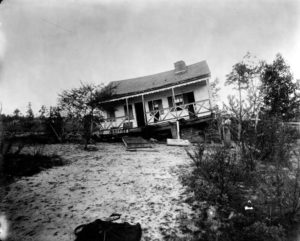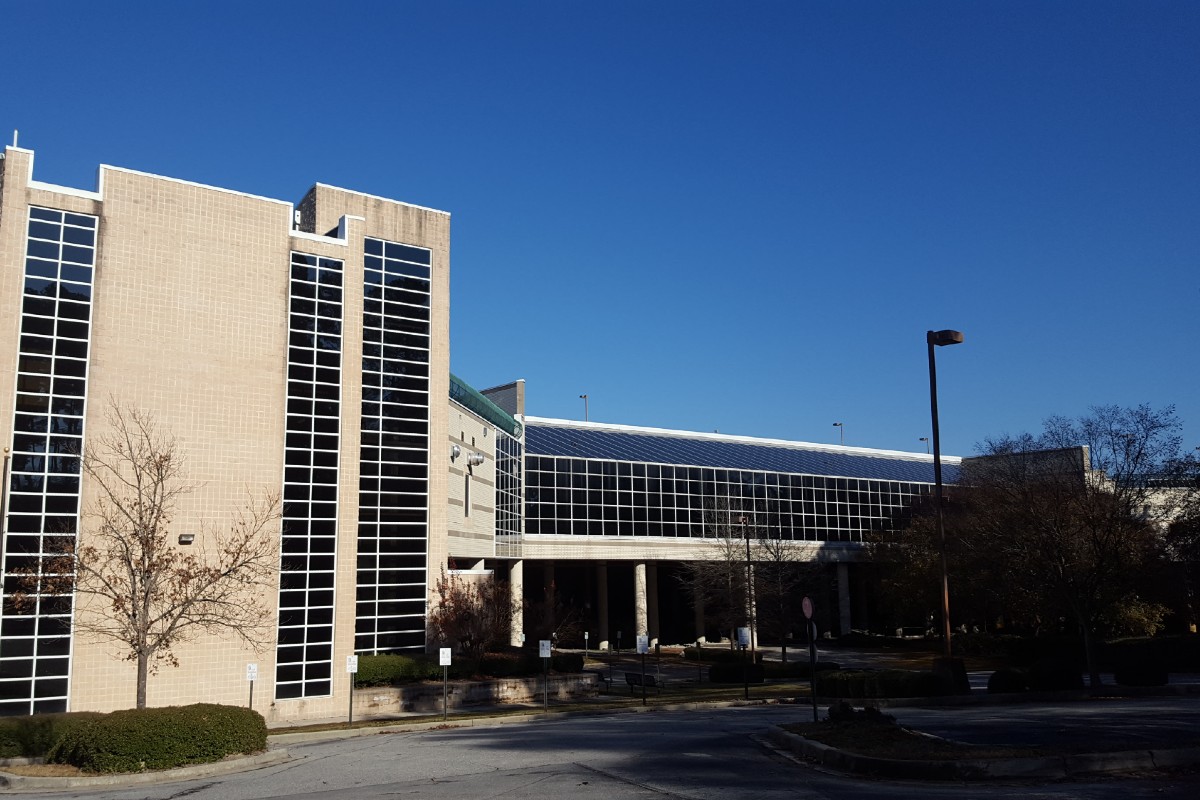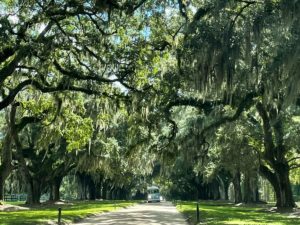STATEHOUSE REPORT | ISSUE 21.06 | FEB. 11, 2022
BIG STORY: Earthquake policy on legislature’s stove, but on back burner
NEWS BRIEFS: Medical marijuana bill moves to House
LOWCOUNTRY, Ariail: Reptile in name only
COMMENTARY, Brack: Speed round of South Carolina opinions
SPOTLIGHT: ACLU of South Carolina
MY TURN, Saul: Having moral courage to stay “true” to the truth
FEEDBACK: South Carolina is dysfunctional
MYSTERY PHOTO: Recognize this place?
Earthquake policy on legislature’s stove, but on back burner

By Samantha Connors | A bill introduced last February by Summerville Republican Rep. Gil Gatch would require insurance providers to offer earthquake insurance coverage on all policies issued in the state. The insurer would also be required to cover loss or damage to the policyholder’s property. But since it was introduced, it has sat in committee.
Earthquakes have been on people’s minds this year as the Midlands region recorded 12 small shakes since the beginning of the year. Since Dec. 27, the state has been rocked by 19 earthquakes. Typically, South Carolina experiences five to 15 per year.
Gatch’s bill, H. 3981, could have a significant impact on South Carolina residents. Earthquake insurance is not currently included in standard homeowner’s insurance.

Gatch told Statehouse Report the bill hasn’t moved since last February because other more pressing issues are currently taking precedent, including medical marijuana and bills on critical race theory.
“There are a lot of other issues that people want to address right now,” he said. “I know that [H. 3981] is something leadership is aware of. We’re just trying to knock out more important issues first, but we will address it.”
Earthquake policies revisited last in 2010
According to the S.C. Emergency Management Division (SCEMD)’s Earthquake Guide, 70 percent of earthquakes in the state center around three areas: Ravenel-Adams Run-Hollywood, Bowman and Middleton-Place-Summerville.
Though earthquake insurance is relatively inexpensive, it often comes with a high deductible, said Dr. Thomas Pratt, a research geophysicist with the U.S. Geological Survey (USGS), making it less feasible for some.
Legislators revisited policies related to earthquakes in 2010 when it adopted new building codes that require structures of a certain size to have a level of seismic resistance.
Though earthquakes are a normal occurrence in South Carolina, many residents are unaware of the state’s annual seismic activity, particularly as people from other areas of the country continue to relocate to South Carolina.
Potential $20 billion impact
The largest East Coast earthquake in recorded history happened on Aug. 31 1886, in Charleston with an epicenter near Summerville. About 100 people died. It destroyed 2,000 buildings and caused $600 million in damage when adjusted for inflation.

More than a century later, the 1886 earthquake remains a notorious piece of South Carolina’s history.
Dr. Norm Levine, a geology and environmental geosciences professor at the College of Charleston, said seismic activity here is normal. He explained the seemingly increased prevalence of earthquakes in recent months is partially due to more sensitive seismometers picking up low-magnitude activity, which most people wouldn’t even notice.
Recent quakes in the Midlands have been minor, all measuring under 2.5 on the Ritcher scale. In comparison, the 1886 earthquake would have measured a whopping 7.3.
If another 7.3 quake hit one of these areas, an SCEMD study estimates 45,000 casualties, 200,000 displaced people and an economic loss exceeding $20 billion dollars.
Is the state ready to rumble?
Experts believe another quake of the magnitude of the one in 1886 is coming — but not as soon as we think.
College of Charleston professor Vijay Vulava studied evidence of old earthquakes in Charleston’s subsurface and found that 7.0 magnitude events occur about every 500 hundred years, which should leave South Carolina with plenty of time before the next one. However, Levine cautions serious earthquake risks still exist.
“Earthquakes don’t just happen as big ones,” said Levine, who also heads the Lowcountry Hazards Center and the S.C. Earthquake Education and Preparedness Program. “Every 125 to 175 years South Carolina might experience something in the 5.0 range. The last 5.0 was in 1910, so we’re sitting in the time zone for something at that level.”
Edgefield was the epicenter of the largest earthquake in recent years when a 4.1 magnitude quake hit in 2014, causing significant shaking but was not strong enough to cause serious structural damage.
A quake of a 7.0 magnitude might be hundreds of years away, but a seismic event in the 5.0 range or stronger is a real threat that could cause liquefaction and more severe structural damage, which begs the question: How prepared is South Carolina?
State preparedness
“We don’t know when the next damaging earthquake will occur, so the only thing you really can do to be prepared is have plans for how to mitigate it afterwards,” said Pratt.
He cites one issue related to earthquakes in the eastern U.S. is the infrequency of these events and the lack of emergency management dollars to plan for one-off occurrences, which leads emergency managers to focus more monetary resources on common events like hurricanes, storm surges and floods.
One could argue that reallocating more state money towards earthquake emergency funding would increase state preparedness, but logistically speaking, it makes little sense to take money away from more pressing issues like hurricanes.

Earthquake response plans and building codes with seismic consideration are two key factors to state preparedness.
SCEMD’s chief of public information Derrec Becker highlighted a few major structures built or retrofitted in recent years to account for potential earthquake damage. In Charleston specifically, the Dock Street Theatre, a historic building considered the “America’s first theater,” retains its historic facade, but beneath the walls lie high-tech, polymesh woven steel to help the building withstand an earthquake.
“The Statehouse was renovated in 1998 and put on pads, cushions for example, to help better withstand the impact of an earthquake,” said Becker. “The back-up dam at Lake Murray in Lexington was built with seismic considerations. A lot of what we’ve done has been those types of things, in addition to making sure residents are aware and prepared as much as they can be.”
In the Charleston area, damage to the Pinopolis or Santee dams poses a potential threat, officials said. Charleston County participates in an annual exercise with Santee Cooper, the state’s utility which owns the Pinopolis Dam, to prepare for a catastrophic event of this nature.
A look at risk models
Based on risk models, the county would have 24 to 48 hours before flood water inundated coastal areas, giving people time to leave, Charleston County EMD director Joe Coates said.
Wood frame structures and buildings with reinforced concrete are the safest in the event of an earthquake. Buildings with brick and masonry veneering are most dangerous as these materials can easily fall off and injure or even kill people in the event of an earthquake.
“We tell people, ‘don’t run outside’ because these brick facades will fall down,” said Pratt. “You don’t want to be running out the door right when the whole wall of bricks falls on top of you. There’s a saying that people don’t die from earthquakes, they die from things falling on them.”
This applies to objects both inside and outside of buildings. In your home, it’s always best to immediately seek cover under a heavy object like a desk or table and be mindful of objects that could fall and hurt someone such as items on bookshelves or on top of kitchen cabinets.
Granting all state residents access to earthquake insurance could mitigate large-scale loss following a major seismic event. Though many experts recommend earthquake insurance, it’s a choice that needs to be considered on an individual basis.
“You have to balance your risk,” said Pratt. “Earthquake insurance tends to have high deductibles, so even though your house is insured if it collapses totally, if the brick facade falls off that might still be under the deductible.”
In the event of a major earthquake in South Carolina, Becker said restoration and inspection of roads, bridges and communication infrastructure would be top priority. Communicating with regional government agencies would also be key to spreading important information and finding ways to bring supplies and medical personnel into impacted areas that may be temporarily cut off.
SCEMD has a specific earthquake plan that is updated every other year, which you can view on SCEMD.org. The state also participates in exercises such as a statewide earthquake drill and earthquake prep week.
Samantha Connors is an editor with the Charleston City Paper, which ran an earlier version of this story. Have a comment? Send to: feedback@statehousereport.com
Medical marijuana bill moves to House

Staff reports | After years of inaction and three weeks of debate, the South Carolina Senate on Wednesday passed a measure that would allow limited medical marijuana use for certain conditions.
A final procedural vote on Thursday on the bill, dubbed the Compassionate Care Act, sent it for consideration by the House, where some say its future is unclear. The bill’s chief proponent, state Sen. Tom Davis, R-Beaufort, has described the proposal as the most conservative cannabis bill in the country. It would not allow smokable forms of marijuana to be dispensed or sold.
Gov. Henry McMaster, a former attorney general and longtime Columbia insider, has said it was premature to say whether he would back the bill that has kicked around the back halls of the Statehouse for seven years.
“This is one that’s going to depend on a lot of things,” he said in a television interview, adding that he’ll wait to see the final version before deciding whether he would potentially sign or veto the bill if it were to arrive on his desk.
In other recent news:
![]() S.C.’s new congressional map challenged as racially discriminatory. A federal complaint filed on behalf of the state’s NAACP chapter alleges the new congressional district map perpetuates a “persistent legacy of discrimination against Black voters.”
S.C.’s new congressional map challenged as racially discriminatory. A federal complaint filed on behalf of the state’s NAACP chapter alleges the new congressional district map perpetuates a “persistent legacy of discrimination against Black voters.”
State agency to invest $11.5M in tech education programs. The S.C. Department of Education will invest $11.5 million of federal COVID-19 relief funds in technical education for South Carolina students, according to a Feb. 9 announcement by S.C. Education Superintendent Molly Spearman.
S.C. House panel considers public vouchers for private schools. The key S.C. House Ways and Means Committee this week took up a new proposal approved by a subcommittee to create a $5,000 voucher for private schools for 5,000 students whose families are eligible for Medicaid or who have parents in the military. The money could only be spent for tuition, fees or books, according to the Associated Press. More: WCSC TV, The State, The Post and Courier.
S.C. House panel mulls bill establishing early voting. A bill to allow no-excuse early voting in South Carolina is being considered by a panel of the House Judiciary Committee. The bill has earned the backing of nearly 50 Republicans in the House, including House Speaker Jay Lucas. More than 1.3 million South Carolinians cast absentee ballots, both in person and by mail, during the general election in 2020 due to the pandemic, setting a state record for advance voting.
Plutonium settlement spending bill heads to S.C. Senate. Legislation to divide a $525 million settlement by the federal government with the state over failure to remove plutonium from the Savannah River Site is headed to the Senate floor after a finance panel endorsed the measure. It calls for a payout that favors the counties that make up the Department of Energy site – Aiken, Barnwell and Allendale counties.
State lawmakers mull bill giving tax credits for hiring ex-cons. A bill sent Feb. 9 to the House floor on a unanimous committee vote would provide employers a tax break of up to $6,500 per hire over three years if the worker stays on the payroll for the duration of the allowed credit.
Slavery defender’s statue could find new home soon. The statue of segregationist and former U.S. Vice President John C. Calhoun that once towered over a downtown Charleston park is still without a permanent home after being removed from its perch nearly two years ago. A deal, announced Monday, appears to be in the works to move the statue to the State Museum in Columbia even as a lawsuit challenges the statue’s removal from the park. More: AP News, WCSC, WPDE.
Charleston approves racial conciliation commission. Charleston City Council voted 9-4 Wednesday night to establish a permanent Human Affairs and Racial Conciliation Commission. The action followed months of controversy that almost sideswiped the effort to proactively deal with the remnants of generational racism. The newly approved commission will seek to promote equity, inclusion and racial conciliation in Charleston through meetings, presentations and research as well as assist in implementing recommendations from Mayor John Tecklenburg and City Council through standing committees, according to one of a number of accepted amendments by Councilman Peter Shahid.
- Want more headlines every business day that are like this? Visit our friends at SC Clips.
Reptile in name only

Cartoonist Robert Ariail interprets the term “RINO” a little differently, but always has an interesting take on what’s going on in South Carolina. Love the cartoon? Hate it? What do you think: feedback@statehousereport.com.
Speed round of South Carolina opinions

By Andy Brack, editor and publisher | Here’s something a little different – a column packed with as many differing opinions as possible.
 Medical marijuana. Thank goodness the Senate finally passed a GOP medical marijuana bill after three weeks of debate. Now the House must follow suit to help relieve the crippling pain suffered by many. And Gov. Henry Mcmaster – don’t let your Reagan “just say no” prosecution past get in the way of compassion.
Medical marijuana. Thank goodness the Senate finally passed a GOP medical marijuana bill after three weeks of debate. Now the House must follow suit to help relieve the crippling pain suffered by many. And Gov. Henry Mcmaster – don’t let your Reagan “just say no” prosecution past get in the way of compassion.
Tax reform. Lawmakers shouldn’t nitpick the state’s tax structure by focusing only on income taxes. Comprehensive tax reform – including reducing billions of dollars of sales tax exemptions to broaden the tax base – is a must.
Challenge maps. Advocates for fair voting must use all tools at their disposal to overturn the legislature’s gerrymandered maps for S.C. House, S.C. Senate and U.S. Congress. Sue big and broadly to help the federal courts understand why maps must be equitably redrawn.
Stop the pandering. It’s almost impossible to go a week without politicians cravenly pandering to get their faces in the media when they should be doing the public good. The latest example of one-upmanship: Former S.C. GOP Rep. Katie Arrington on Wednesday rolled out another bid for Congress in the Charleston area showing mindless fealty to Donald Trump. The next day, the current seatholder – GOP U.S. Rep. Nancy Mace – puppeted support for the former president, who earlier endorsed Arrington, on a sidewalk in front of New York’s Trump Tower in what can only be described as pitiful politicking.
Support Childs. All of South Carolina’s elected leaders need to do whatever they can to support the potential nomination of U.S. District Judge Michelle Childs to the U.S. Supreme Court. This can be an exercise in bipartisanship. Since the founding of the republic, only three South Carolinians have served on the high court – John Rutledge (1790-91 and later as chief justice), William Johnson (1804-1834) and James Byrnes (1941-42).
Be careful still with COVID. While mask mandates are being removed across the country as it seems to recover from the COVID-19 virus, it is still active. Get both shots and a booster for protection. Wear masks if you feel unsafe. Wash your hands frequently.
Racial reconciliation. Hats off to Charleston city officials for establishing a permanent racial reconciliation commission to deal with the vestiges of prejudice. Cities and counties across the state need to emulate Charleston’s policy example to bring people together.
Kill vouchers. Stop. Using. Public. Money. For. Private. Schools. Period.
Pass hate crimes law. It’s embarrassing South Carolina is one of just two states without a hate crimes law.
Fix the Charleston loophole. Amend a state law to fix the loophole that allowed a racist murderer to kill nine worshippers at Emanuel AME Church in 2015.
Reform ethics laws. Media outlets around the state have been showcasing how the state’s ethics laws are relatively toothless, especially for legislators. Voters expect ethical public officials. Pass meaningful reform to prove you are.
Split DHEC. Follow the lead of S.C. Finance Committee Chair and Sen. Harvey Peeler, R-Cherokee, who suggests splitting the state Department of Health and Environmental Control so each part can do a better job.
Stop picking on LGBTQ community. Legislators need to get off the kick of micromanaging Columbia’s ban on so-called “conversion therapy.” Some people are gay. Get over it.
Spend surpluses wisely. Lawmakers should keep from looking at shiny new things on which to spend billions of surplus dollars. Rather, invest it in long-suffering needs – better education, more access to health care, improved prison funding and more.
Be fair on voting. Expand voting opportunities in South Carolina, instead of creating hurdles to keep people from exercising their fundamental democratic right.
Support small businesses. We see more and more attention by state officials to giving big money to big companies. Why can’t they go to banks for funding? That’s capitalism. If the state is going to invest in South Carolina, focus more on small businesses.
Andy Brack, editor and publisher of Statehouse Report, also is publisher of the Charleston City Paper. Have a comment? Send to: feedback@statehousereport.com.
ACLU of South Carolina
 The public spiritedness of our underwriters allows us to bring Statehouse Report to you at no cost. This week’s spotlighted underwriter is the American Civil Liberties Union. The ACLU of South Carolina is dedicated to preserving the civil liberties enshrined in the U.S. Constitution and Bill of Rights. Through communications, lobbying and litigation, the ACLU of South Carolina works to preserve and enhance the rights of all citizens of South Carolina. Foremost among these rights are freedom of speech and religion, the right to equal treatment under law, and the right to privacy.
The public spiritedness of our underwriters allows us to bring Statehouse Report to you at no cost. This week’s spotlighted underwriter is the American Civil Liberties Union. The ACLU of South Carolina is dedicated to preserving the civil liberties enshrined in the U.S. Constitution and Bill of Rights. Through communications, lobbying and litigation, the ACLU of South Carolina works to preserve and enhance the rights of all citizens of South Carolina. Foremost among these rights are freedom of speech and religion, the right to equal treatment under law, and the right to privacy.
Having moral courage to stay “true” to the truth

By Dr. Robert Saul | In many ways, the pursuit of truth is just the preamble to using the truth with integrity. Pursuing the truth and then applying the truth requires the deep understanding that you have to stay “true” to the truth if you are going to make a difference going forward.
 Forces that are difficult to control are often pushing you in different directions to deviate from truth-telling and not capitulating to those who are using false information to peddle a false narrative. Sometimes these forces are subtle and their effects minimal, but these forces can also be forceful in their mal-influence and their effects corrosive (or even corrupt) in their outcome.
Forces that are difficult to control are often pushing you in different directions to deviate from truth-telling and not capitulating to those who are using false information to peddle a false narrative. Sometimes these forces are subtle and their effects minimal, but these forces can also be forceful in their mal-influence and their effects corrosive (or even corrupt) in their outcome.
Seeking the truth requires certain key elements:
- Active listening – truth seekers are open to listen to various viewpoints and actually process them.
- Reading – truth seekers are engaged readers. By engaged, I mean reading properly vetted materials that are not intentionally biased.
- Openness to diverse views – Without the ability to process diverse views we are unable inability to engage in rational discourse.
- Humility – When one is humble, they recognize their own humanity and maintain a degree of modesty.
- Sincerity – The ability to refrain from deceit or hypocrisy reveals one’s commitment to pursue facts and truth with honesty.
- Role of science – The scientific method involves careful observation, a healthy but rigorous skepticism about what is observed, and an acceptance that one should be cautious about the interpretation.
After seeking the truth, maintaining fidelity to the truth, even when it is unpopular or shouted down as untrue, requires a unique quality. Robert F. Kennedy talked about the quality of moral courage, a quality that is difficult to maintain in the face of mounting pressure. He is quoted as saying that “moral courage is a rarer commodity than bravery in battle or great intelligence. Yet it is the one essential, vital quality for those who seek to change a world that yields most painfully to change…Few men are willing to brave the disapproval of their peers, the censure of their colleagues, [and] the wrath of their society.”
He distinguishes moral courage from the type of courage that is typically discussed with the courage shown in battle. His description does not diminish the latter as it emphasizes the difficulty to stay the course and follow the truth in situations that demand moral integrity, in situations where the noise around us can be confusing, in situations where we need to stand strong, and in situations where we might be made to feel uncomfortable. I would agree that moral courage is the measure of our ability to stay with the truth when you are being challenged to capitulate to other forces. The sincerity and humility of truth-seeking would appear to be antithetical to the strength needed for moral courage, but they are critical to adhere to the pursuit of moral courage.
The list of people with moral courage and the willingness to put up with potential retribution is long – Martin Luther King, Jr., John Lewis, Rabbi Israel Dresner, Daniel Ellsberg, Rosa Parks, Franz Jägerstätter, the Little Rock Nine, and so many others. Recently, so many have been willing to speak truth to power – William Taylor, Colonel Vindman, Maria Yovanovitch, Brad Raffensperger, and others – to assure that truth can lead the way. Too often those with moral courage have been singled out for verbal abuse and recrimination. Yet the ability to hold their ground and stay the course and to let right triumph over might displays the moral courage necessary to stay true to the truth. We will all waver at times, so this is a difficult virtue to uphold.
Moral courage has become a commodity that seems to be undervalued. Accepting lies or falsehoods simply because they are repeated frequently has become too commonplace. Moral courage should a part of each of our lives but unfortunately it is not.
How do we change that? Well, those of us in trusted positions (medicine, law, clergy, the press, and others) need to maintain moral integrity…but really, all of us should do the same. The unsung heroes are those that uphold that standard and are not even “required” to do it. They do it because it is the right thing to do. And we are all better for it.
Dr. Robert Saul is a Greenville pediatrician and the author of “My Children’s Children: Raising Young Citizens in the Age of Columbine” and “All About Children.” Have a comment? Send to: feedback@statehousereport.com.
South Carolina is dysfunctional
To the editor:
![]() In South Carolina, the elected officials have become our Brahmin ruling class, remote from the needs of the people of our state. We think the condition of the current ill-service will not change. The best we can do is ask legislators to reach higher and try harder to do better. So, we hope for the best available. We have given up expecting the best from our governance. That seems impossible. We are in a low-expectations mode lacking genuine leadership.
In South Carolina, the elected officials have become our Brahmin ruling class, remote from the needs of the people of our state. We think the condition of the current ill-service will not change. The best we can do is ask legislators to reach higher and try harder to do better. So, we hope for the best available. We have given up expecting the best from our governance. That seems impossible. We are in a low-expectations mode lacking genuine leadership.
We are driving with one hand on our collective wheel. The pockmarked roads of contemporary society need right and left hands. Eyes forward, brain engaged focused on the complicated challenges. South Carolina limps along with an agrarian seasonal legislative calendar oblivious to the changed environment. Selection and delegation are based on geographic allocation of the appointment authority. Last century’s farmer-legislator model ceased its usefulness long ago. It’s not the useful source of the needed governance of 5-plus million people.
South Carolina is dysfunctional. We have a governor who fantasizes he actually influences the humming economy. A legislature seeing the future horizon through magnifying glasses. A development policy based on crony capitalism. giving away our future tax revenue while we do without stuff. The virtue of “less is more” is extolled, contradicted by mandates from the Communistic central command. We misinterpret population growth as validation.
Just consider the garbage legislation that has to be culled every session. Hair-brained stuff from the minds focused on the picayune matters. Altogether, too few diamonds in the rough to be honed, polished and put into service for the people of SC.
South Carolina needs to leap past the 20th century. A full-time legislative body, well-paid with competent staffing to conduct the business of governing well, is in order. Red flag issue-based governance designed to rally and rile up the political base that is being used now is failing us and unable to produce the most essential necessity: Education of our young. Rendering most of us impotent to adapt and move forward. This is not excellent governance of the modern state.
Strip out the confused, conflicted, corruption- prone administrative functions from the legislature. Get the legislature out of the vassal-squire model where power retention is achieved by fealty and loyalty to the appointer. That keeps legislators unnecessarily in every entity’s business. Legislators are not the “know-it-alls” that the current model assumes. Far from it is the obvious case.
Legislators become the identifiable limiting factor in the governance that is expressed by Brack, correctly identifying that the South Carolina fish stinks from the head.
– Fred Palm, Edisto Island, S.C.
Send us your thoughts
We receive a few comments a week and look forward to publishing. But often we can’t because we can’t verify the identity of the writer. To be published, you’ve got to provide us with contact information so we can verify your letters. Verified letters to the editor are published weekly. We reserve the right to edit for length and clarity. Comments are limited to 250 words or less. Please include your name and contact information.
- Send your letters or comments to: feedback@statehousereport.com
Recognize this?

This building has been in the news lately. Where is it and why has it been in the news? Send your guess to feedback@statehousereport.com — and remember to include your name, home city and contact information.
 Last week’s mystery, “Lots of trees,” shows an iconic entrance to Boone Hall in Mount Pleasant. The photo was shared by Lauren Swann of North Charleston. Congratulations to those who recognized it: George Graf of Palmyra, Va; Bill Segars and Don Clark, both of Hartsville; Evie B. Evans and David Lupo, both of Mount Pleasant; Elizabeth Jones and Jay Altman, both of Columbia; Allan Peel of San Antonio, Texas; Randy Herald of Lexington; Curts Joyner of Charleston; Pat Keadle of Wagener; William Guion of Cochiti Lake, New Mexico; Frank Bouknight of Summerville; Penny Forrester of Tallahassee, Fla.
Last week’s mystery, “Lots of trees,” shows an iconic entrance to Boone Hall in Mount Pleasant. The photo was shared by Lauren Swann of North Charleston. Congratulations to those who recognized it: George Graf of Palmyra, Va; Bill Segars and Don Clark, both of Hartsville; Evie B. Evans and David Lupo, both of Mount Pleasant; Elizabeth Jones and Jay Altman, both of Columbia; Allan Peel of San Antonio, Texas; Randy Herald of Lexington; Curts Joyner of Charleston; Pat Keadle of Wagener; William Guion of Cochiti Lake, New Mexico; Frank Bouknight of Summerville; Penny Forrester of Tallahassee, Fla.
- Send us a mystery. If you have a photo that you believe will stump readers, send it along (but make sure to tell us what it is because it may stump us too!) Send to: feedback@statehousereport.com and mark it as a photo submission. Thanks.
- ORDER NOW: Copies are in Lowcountry-area bookstores now, but if you can’t swing by, you can order a copy online today.
- Now available as an e-book!
ABOUT STATEHOUSE REPORT
Statehouse Report, founded in 2001 as a weekly legislative forecast that informs readers about what is going to happen in South Carolina politics and policy, is provided to you at no charge every Friday.
- Editor and publisher: Andy Brack, 843.670.3996
Donate today
We’re proud to offer Statehouse Report for free. For more than a dozen years, we’ve been the go-to place for insightful independent policy and political news and views in the Palmetto State. And we love it as much as you do.
But now, we can use your help. If you’ve been thinking of contributing to Statehouse Report over the years, now would be a great time to contribute as we deal with the crisis. In advance, thank you.
Buy the book
Now you can get a copy of editor and publisher Andy Brack’s We Can Do Better, South Carolina! ($14.99) as a paperback or as a Kindle book ($7.99). . The book of essays offers incisive commentaries by editor and publisher Andy Brack on the American South, the common good, vexing problems for the Palmetto State and interesting South Carolina leaders.
More
- Mailing address: Send inquiries by mail to: P.O. Box 21942, Charleston, SC 29413
- Subscriptions are free: Click to subscribe.
- We hope you’ll keep receiving the great news and information from Statehouse Report, but if you need to unsubscribe, go to the bottom of the weekly email issue and follow the instructions.
- Read our sister publication: Charleston City Paper (every Wednesday in print; Every day online)
- © 2022, Statehouse Report, a publication of City Paper Publishing, LLC. All rights reserved.




Thanks for running SC Dysfunctional. Curious if it rings with folks.